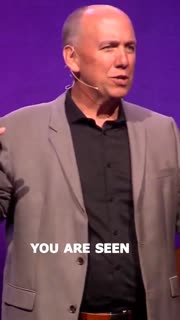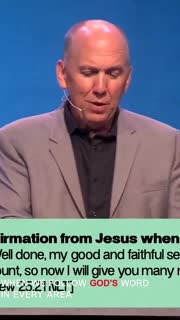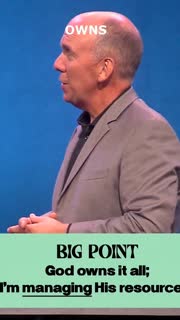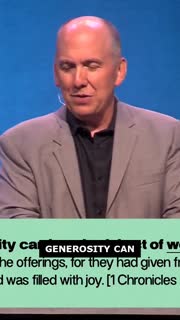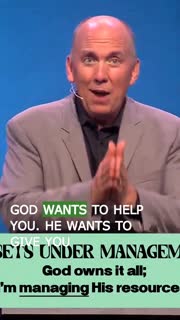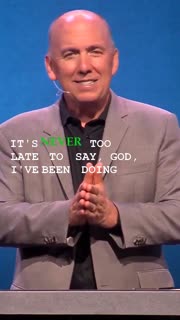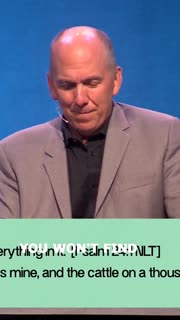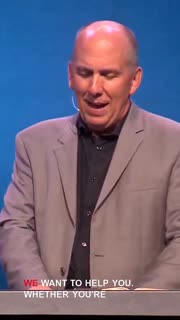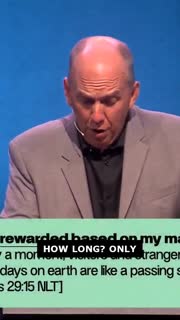Stewardship and Generosity: Honoring God with Finances
Devotional
Sermon Summary
Bible Study Guide
Sermon Clips
1. "You are seen and known by the Father in heaven. He knows your name. He cares about you. Jesus came to give his life for you, to adopt you into his family. And so whatever has happened in your life, today you can know the truth about him and how he sees you. He's a good God. He's a faithful father." [23:25] (18 seconds)
2. "When we follow God's word in every area of life, there's just life seems to work better, right? That God has wisdom for us. What He gives us in the word is for our good. And so we want ultimately to be able to say God, I want, I want this. I want to achieve success in my finances. And here's what that looks like. Hearing this affirmation from Jesus when He returns. Matthew chapter 25, here's what Jesus says. He says this is what some people are going to experience. The master was full of praise. Well done, my good and faithful servant. You have been faithful in handling this small amount." [42:23] (34 seconds)
3. "God owns it all. I'm managing his resources. Friends, if we get that, like really get it, it changes everything. That's the big picture of what David is saying in this prayer. When I recognize God's ownership, here's what happens. First of all, I acknowledge that everything ultimately belongs to him. David repeats this theme several times, like in verse 11. He says, Everything in the heavens and on earth is yours, O Lord, and this is your kingdom. Think about that. He's saying everything in the universe, like the stars, as far as you can see, everything on the earth, Lord, is yours. Even this nation of which I'm the king, he's going, this kingdom belongs to you. God owns it all." [51:15] (53 seconds)
4. "Every act of generosity can be an act of worship. When Mary and I give, we don't give out of a sense of, well, I guess we gotta give God a tip or it's an obligation, I'm a pastor. We feel like we get to give. God, you are so great. You've been so kind to us. Your unlimited grace and power, the promises that you give us, your constant presence. Lord, we just thank you. We bless you. We love you. That's what the people are saying here. Look at verse 11. David says, we adore you as the one who is over all things. Verse 13, O our God, we thank you and praise your glorious name. They're just saying, God, we love you." [56:04] (45 seconds)
5. "God wants to help you. He wants to give you principles from his word. And there's a lot of them to help you make good financial decisions. You're not alone in the battle. We're gonna be talking about some practical stuff here in the coming weeks and the course and in the messages. I hope you'll join us on the journey. Point number one, God owns it all. This past week I was, found out about a business owner at Grace who has hired some formerly incarcerated people. And because that's a real passion of ours, the church family, just to make a difference at Lorraine Correctional, we have guys who are coming out after the parole violation." [01:06:22] (38 seconds)
6. "It's never too late to say, God, I've been doing it my way. I've not really consulted you. And I realize that everything I have are actually assets under management. Assets under, right? I don't own these. These are under my management, but God owns it all. I'm simply managing his resources, right? And one day I'm gonna be rewarded or not based on how I've done. And so will you. So the great news is this. God wants to help you. He wants to give you principles from his word. And there's a lot of them to help you make good financial decisions. You're not alone in the battle." [01:06:06] (40 seconds)
7. "You won't find one verse in all of the Bible that shows that God has somehow surrendered ownership over to us. Management, yes. Ownership, no. Some might go, well, you know, I don't know, maybe God owns everything like in nature and everything, but at least I own myself. Who made you? Even then, 1 Corinthians chapter six says this, you are not God. You're own. You were bought at a price. So friends, we can say this again. God owns it all. I'm simply managing his resources. So how does that relate to my relationship with money like this? How you handle money, your 401k, your checkbook, your house, your possessions, everything you have, how you handle those reveals who you think really owns them." [54:24] (58 seconds)
8. "We want to help you. Whether you're feeling like you're in a tough spot financially, you're doing really well, we all want to keep growing. I mentioned earlier, there's a six-week course called True Financial Freedom. It's with Bob and Linda Loddick. You'll see their picture there. They have a great story of some financial messes they were in. And in a six-week class, they walk you through the same blueprint that God used in their lives to lead them from a mountain of debt to a, really, a life of eternal impact. And each session is full of specific, practical advice, real-life stories that you'll find enjoyable. And by the end of the class, I think you'll find that you have more financial margin and you're living with less financial stress in your life." [01:03:33] (49 seconds)
9. "You know you would not ever do something with someone else's possessions without doing what? Without consulting them, right? Without saying, hey, I was wondering if, you know, we could, if God owns it all, if we really believe that, and I'm managing his resources, that's a game changer, right? So, one of the first things I do is I go to God and I say, God, do you want to give direction on this? Is there a way you want me to move in this way so that I can honor you? Rather than saying, this is my checkbook, my car, my house, my this, to say, God, this is all yours. You've entrusted them to me. What would you like to do with your stuff?" [59:38] (45 seconds)
10. "We are here for how long? Only a moment. Visitors and strangers in the land as our ancestors were before us. Our days on earth are like a passing shadow gone so soon without a trace. I think the older I get, the more I go, wow, it's so true. Gone so soon. Compared to how long our eternal home is gonna be, our life here is so brief, right? We know we're gonna give an account one day. How did we manage what he entrusted to us? You see the verse at the top of your notes? First Corinthians chapter four. A person who is put in charge as a manager must be what? Faithful. Faithful to whom? Faithful to the Lord. Faithful to the owner." [01:01:24] (51 seconds)
Ask a question about this sermon
2. "When we follow God's word in every area of life, there's just life seems to work better, right? That God has wisdom for us. What He gives us in the word is for our good. And so we want ultimately to be able to say God, I want, I want this. I want to achieve success in my finances. And here's what that looks like. Hearing this affirmation from Jesus when He returns. Matthew chapter 25, here's what Jesus says. He says this is what some people are going to experience. The master was full of praise. Well done, my good and faithful servant. You have been faithful in handling this small amount." [42:23] (34 seconds)
3. "God owns it all. I'm managing his resources. Friends, if we get that, like really get it, it changes everything. That's the big picture of what David is saying in this prayer. When I recognize God's ownership, here's what happens. First of all, I acknowledge that everything ultimately belongs to him. David repeats this theme several times, like in verse 11. He says, Everything in the heavens and on earth is yours, O Lord, and this is your kingdom. Think about that. He's saying everything in the universe, like the stars, as far as you can see, everything on the earth, Lord, is yours. Even this nation of which I'm the king, he's going, this kingdom belongs to you. God owns it all." [51:15] (53 seconds)
4. "Every act of generosity can be an act of worship. When Mary and I give, we don't give out of a sense of, well, I guess we gotta give God a tip or it's an obligation, I'm a pastor. We feel like we get to give. God, you are so great. You've been so kind to us. Your unlimited grace and power, the promises that you give us, your constant presence. Lord, we just thank you. We bless you. We love you. That's what the people are saying here. Look at verse 11. David says, we adore you as the one who is over all things. Verse 13, O our God, we thank you and praise your glorious name. They're just saying, God, we love you." [56:04] (45 seconds)
5. "God wants to help you. He wants to give you principles from his word. And there's a lot of them to help you make good financial decisions. You're not alone in the battle. We're gonna be talking about some practical stuff here in the coming weeks and the course and in the messages. I hope you'll join us on the journey. Point number one, God owns it all. This past week I was, found out about a business owner at Grace who has hired some formerly incarcerated people. And because that's a real passion of ours, the church family, just to make a difference at Lorraine Correctional, we have guys who are coming out after the parole violation." [01:06:22] (38 seconds)
6. "It's never too late to say, God, I've been doing it my way. I've not really consulted you. And I realize that everything I have are actually assets under management. Assets under, right? I don't own these. These are under my management, but God owns it all. I'm simply managing his resources, right? And one day I'm gonna be rewarded or not based on how I've done. And so will you. So the great news is this. God wants to help you. He wants to give you principles from his word. And there's a lot of them to help you make good financial decisions. You're not alone in the battle." [01:06:06] (40 seconds)
7. "You won't find one verse in all of the Bible that shows that God has somehow surrendered ownership over to us. Management, yes. Ownership, no. Some might go, well, you know, I don't know, maybe God owns everything like in nature and everything, but at least I own myself. Who made you? Even then, 1 Corinthians chapter six says this, you are not God. You're own. You were bought at a price. So friends, we can say this again. God owns it all. I'm simply managing his resources. So how does that relate to my relationship with money like this? How you handle money, your 401k, your checkbook, your house, your possessions, everything you have, how you handle those reveals who you think really owns them." [54:24] (58 seconds)
8. "We want to help you. Whether you're feeling like you're in a tough spot financially, you're doing really well, we all want to keep growing. I mentioned earlier, there's a six-week course called True Financial Freedom. It's with Bob and Linda Loddick. You'll see their picture there. They have a great story of some financial messes they were in. And in a six-week class, they walk you through the same blueprint that God used in their lives to lead them from a mountain of debt to a, really, a life of eternal impact. And each session is full of specific, practical advice, real-life stories that you'll find enjoyable. And by the end of the class, I think you'll find that you have more financial margin and you're living with less financial stress in your life." [01:03:33] (49 seconds)
9. "You know you would not ever do something with someone else's possessions without doing what? Without consulting them, right? Without saying, hey, I was wondering if, you know, we could, if God owns it all, if we really believe that, and I'm managing his resources, that's a game changer, right? So, one of the first things I do is I go to God and I say, God, do you want to give direction on this? Is there a way you want me to move in this way so that I can honor you? Rather than saying, this is my checkbook, my car, my house, my this, to say, God, this is all yours. You've entrusted them to me. What would you like to do with your stuff?" [59:38] (45 seconds)
10. "We are here for how long? Only a moment. Visitors and strangers in the land as our ancestors were before us. Our days on earth are like a passing shadow gone so soon without a trace. I think the older I get, the more I go, wow, it's so true. Gone so soon. Compared to how long our eternal home is gonna be, our life here is so brief, right? We know we're gonna give an account one day. How did we manage what he entrusted to us? You see the verse at the top of your notes? First Corinthians chapter four. A person who is put in charge as a manager must be what? Faithful. Faithful to whom? Faithful to the Lord. Faithful to the owner." [01:01:24] (51 seconds)
